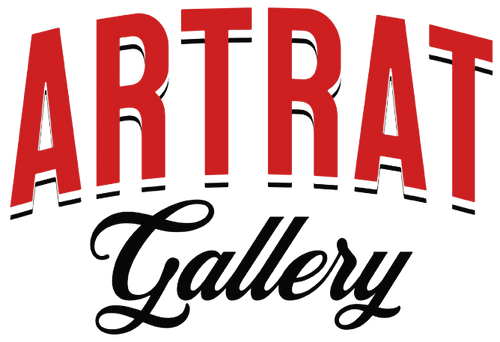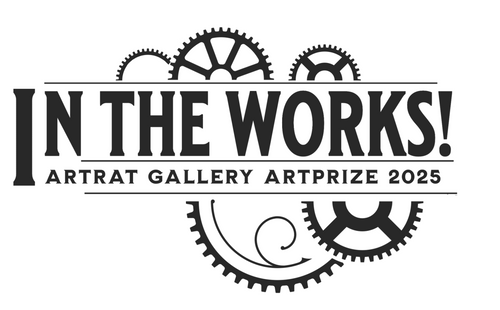This Sunday, March 12, ArtRat Gallery hosts virtuoso banjo player and fiddler Aaron Jonah Lewis at Americana Sundays, ArtRat’s monthly concert series. The show runs 3-5pm at 46 Division Ave. S in the heart of downtown Grand Rapids. (Admission $20; tickets available on Eventbrite.)
The classically trained Detroit resident has been elbow-deep in traditional American music since their first lessons at the age of five with Kentucky native Robert Oppelt. Their concerts take audiences on a journey through the back roads of American old time and folk music, with detours through ragtime and early jazz. Lewis has taken blue ribbons at the Appalachian String Band Festival in Clifftop, WV, and at the Old Fiddlers Convention in Galax, VA, the country's oldest and largest fiddlers convention.
Your musical path has included both classical and traditional American music. Can you describe your musical origins and artistic progress?
It all started when my grandfather brought a full-size viola to the house when I was three years old. According to family lore, I would pull it out from under the piano every day and open the case up and say "I want to play it." So when I was a little older I started taking violin lessons, and I made it as far as Interlochen Arts Academy for my junior and senior years of high school. After high school, I decided that I was done with the violin, and soon after that I met a musician from Virginia — Aaron Greenhood — who introduced me to bluegrass. I wasn't especially interested but it turned out to be very fun and challenging, and we became close friends. I ended up moving to Virginia and started a band with him. Aaron introduced me to Ben Belcher, who gave me my first banjo and the inspiration to want to play, and from bluegrass I started exploring its origins and influences, old time, blues and other styles from the early 20th century, early jazz and country.

When I think about the musical decisions I've made in my life, they have always been informed by my relationships with people. Some people decide what kind of music they want to play and then look for people to play with and learn from. For me, it's the other way around — I find people who inspire me and who I like to spend time with, and I end up getting into whatever they're into. If Aaron Greenhood had been into samba or polka or reggae, I probably would be in a very different place right now!
You're a virtuoso of banjo playing rooted in 19th-century classic fingerstyle. What distinguishes this discipline from other banjo styles?
In this style, the banjo is set up with nylon strings and played with bare fingers picking up, as opposed to bluegrass picking in which steel strings and finger picks are used, or clawhammer, which uses a down-stroke with the right hand. Much of the repertoire exists in written form, as this style was popular before audio recording technology was widely available for commercial use.
I do get a thrill reading a piece of banjo music for the first time that's never been recorded before, knowing that I'm having the same experience as someone 120 years ago would have had, discovering the music without any audible reference. For more information about classic banjo, I highly recommend this excellent resource — classic-banjo.ning.com — and to answer this specific question in detail, classic-banjo.ning.com/page/f-a-q#whatisclassicbanjo.
You play music from a variety of musical genres and traditions. Does your classical training in violin, for example, inform your traditional playing, or vice versa?
Yes, it certainly goes both ways! My Suzuki training encouraged learning by ear, and that has served me very well in the oral traditions of old time, jazz, bluegrass, country, blues, et al. I've found that when I play classical I bring a lot more to the table than I did in my younger years, thanks to my experience with improvisation and diverse traditional musics.
I did have to unlearn some of my classical training in order to be able to relax and get into improvisation; let go of rigid ideas of what it means to be "in tune"; and to develop a strong sense of rhythm, which is often overlooked in classical training. The training I had in my youth gave me a solid technical foundation, which made it easier for me to pick up new musical ideas and run with them, but I also had to let go of ideas of what was "right" or "good” and get past the endless quest for excellence and perfection that can distract from what is useful and meaningful in the moment.
In addition to your solo career, you're a founding member of The Corn Potato String Band. What distinguishes your solo repertoire from your work with Corn Potato?
Not much! My solo work is missing the musical input and voices of my longtime collaborators Lindsay McCaw and Ben Belcher, and I can't bring the same level of variety and excitement to a solo performance as I can with Ben and Lindsay. On the other hand, I am able to get a little more into the storytelling side of things and sharing historical context when I'm on my own. With Corn Potato, we try to keep the hits coming, and in my solo shows I have a bit more space and intimacy to share the stories behind the music.
What do you like about performing in downtown GR?
The people! Anywhere I perform, it's the people who make the show. I absolutely can't do it on my own, and folks in GR continue to demonstrate a real dedication and love for music, both new and old, familiar, and obscure.
RESERVE YOUR TICKETS NOW FOR THESE AMERICANA SUNDAYS!
April 16: Chris Bathgate. Chris Bathgate is an American singer/songwriter born in rural Iowa, raised in rural Illinois and currently residing in Michigan. He began drawing attention as a solo artist in 2005 upon the release of his first album, Silence is for Suckers, after a slew of self-produced EPs / Singles and a stint in the short-lived (but much loved) group The Descent of the Holy Ghost Church. (Admission $15; tickets available on Eventbrite.)
May 21: Kyle Rasche (Chain of Lakes) and Dan Bracken. Kyle Rasche is a father, husband, and songwriter who has released his seven albums under the moniker Chain of Lakes. Kyle writes what he knows: family, friendship, and the beauty and strife that comes with an unflinching compulsion to sing about his feelings. Joining Kyle for the Americana Sundays series is songwriter and finger-style guitarist Daniel Bracken. Dan plays music informed by his rich history as a recordist and producer for Public Media, and as a performer in the US and Ireland. (Admission $20; tickets available on Eventbrite.)
June 11: Hearth & Hymn. Celebrate Pride Month with Hearth & Hymn! Hearth & Hymn is a close-harmony, minimalist folk project produced by songwriters, song collectors and multi-instrumentalists Samantha Cooper and Elisabeth Pixley-Fink. Beloved artists in the Michigan folk scene, their masterful harmonies and seamless vocal blend capture a room. Raiding family songbooks and sharing old tunes, Hearth & Hymn reimagines songs that move them through a queer, feminist lens. (Admission $20; tickets available on Eventbrite.)
July 9: Jes Kramer. A stack of battery-powered keyboards disguised as a woman, woven together by big emotions and standing upright with the help of the nostalgic sounds from childhood. Having played shows for over half of her life, Kramer invites you to share the comfort of this space with her at every show, including you into the process as she builds songs layer by layer in front of the audience. (Admission $15; tickets available on Eventbrite.)
August 20: The Wild Honey Collective. The Wild Honey Collective formed in the summer of 2020 to perform original songs and traditional American folk music. Singers and songwriters Tommy McCord, Danielle Gyger, Timmy Rodriguez and Dan O’Brien — joined shortly thereafter by pedal steel guitarist Adam Aymor — launched the project in rural Michigan as a back-porch acoustic gathering purely for the love of music in the midst of the COVID-19 pandemic. The Wild Honey Collective is ever-evolving and encompasses sounds of traditional string band music, rowdy country rock, psychedelia, classic pop and more to preserve and nurture the lineage of Cosmic American Music. (Admission $20; tickets available on Eventbrite.)
Sept. 17: Nic Gareiss. One of Dance Magazine’s “25 to Watch,” Nic Gareiss (he/they) is swiftly becoming recognized for his singular voice in the realm of dance, music, and the traditional arts. A child of the folk revival, Gareiss grew up being dragged to folk festivals in the Midwest. At these events Nic learned Appalachian, Irish, English, and Canadian percussive dance surrounded by fiddlers, banjo-players, balladeers, and folksingers. This mix of movement, instrumental melodies, and traditional songs from rural places has become the heart of Nic's creative work. Informed by 25 years of ethnographic study and performance, Gareiss’ work draws from many percussive dance practices to weave together a technique facilitating his love of improvisation; clog, flatfoot and step dance vocabulary; and musical collaboration. (Admission $20; tickets available on Eventbrite.)
Oct. 15: Tiyi Schippers. Join author and storyteller Spooky Ms. Tiyi for an evening/afternoon of true ghost stories based on her own encounters with the otherworld sure to rattle your senses and chill you to the bone.Tiyi is an educator, storyteller, author and poet. She grew up in the middle of the 20th century, the third child in a family of 10 kids. Hers was the fourth generation to live in a Victorian home on the northwest side of Chicago. They did not dwell there alone however. The house claimed an array of ghosts and spirits consisting of both her ancestors, as well as those who lived there before her ancestors acquired the home at the end of the 19th century. (Admission $20; tickets available on Eventrite.)






